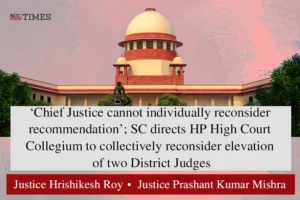Supreme Court: In a writ petition filed by the two seniormost District and Sessions Judges serving in the State of Himachal Pradesh, praying for minutes of meeting of the collegium of the Himachal Pradesh High Court, whereby names of officers’ junior to the petitioners have been recommended for elevation as Judges of the High Court ignoring the directions of reconsideration given by the Collegium of the Supreme Court of India, the division bench of Hrishikesh Roy* and Prashant Kumar Mishra, JJ. held that the Chief Justice of a High Court cannot individually reconsider a recommendation, and it can only be done by the High Court Collegium acting collectively. Further, the Court directed the High Court Collegium to reconsider the names of Chirag Bhanu Singh and Arvind Malhotra for elevation as Judges of the High Court, following the Supreme Court Collegium decision dated 4-01-2024 and the Law Minister’s letter dated 16-01-2024.
Background:
The petitioners i.e. Chirag Bhanu Singh and Arvind Malhotra were recommended by the then Collegium of the High Court on 6-12-2022 for elevation as judges of the Himachal Pradesh High Court. On 12-07-2023, the Supreme Court Collegium, however, deferred their consideration. Thereafter, on 4-01-2024, the Supreme Court Collegium resolved that the proposal for the elevation of both be remitted for reconsideration to the Chief Justice of the Himachal Pradesh High Court. Thus, a request vide the Law Minister’s letter was made that fresh recommendations be sent for the two officers against the available service quota vacancies in the Himachal Pradesh High Court.
The petitioners were aggrieved that the High Court Collegium without first reconsidering the two petitioners in terms of the Supreme Court Collegium Resolution dated 4-01-2024 as communicated in the Law Minister’s letter had recommended two other judicial officers for elevation. The argument was that if the latter recommended persons are considered for appointment ahead of the two petitioners, it would amount to ignoring their seniority and long-standing unblemished service.
Issues, Analysis and Decision:
A) Whether the writ petition is maintainable?
After taking note of Supreme Court Advocates-on-Record Assn. v. Union of India, (1993) 4 SCC 441 (‘Second Judges case’), wherein it was observed that the scope of judicial review in appointment of judges is limited as it introduces the ‘judicial element’ in the process and further judicial review is not warranted apart from some exceptions such as want of consultation amongst the named constitutional functionaries.
Thus, the Court concluded that the ‘lack of effective consultation’ and ‘eligibility’ falls within the scope of judicial review. ‘Suitability’ is non-justiciable and resultingly, the ‘content of consultation’ falls beyond the scope of judicial review.
The Court thus said that the absence of consultation amongst the members of the Collegium would be within the limited purview of judicial review.
The Court noted that the Chief Justice of the High Court submitted that he had never received the Resolution of the Supreme Court Collegium.
The Court said that the aforesaid re-consideration resolution was requisitioned only for factual determination as to whether ‘effective consultation’ was made, in terms of the resolution of the SC Collegium. This scrutiny has nothing to do with the ‘merits’ or the ‘suitability’ of the officers in question but to verify whether ‘effective consultation’ was made. Such scrutiny is permissible within the limited scope of judicial review. Therefore, the Court held that the present writ petition for this limited scrutiny is found to be maintainable.
B) Whether elevation for judgeship in the High Court has to be considered collectively by the High Court Collegium or whether the Chief Justice acting individually can reconsider the same?
The Court said judicial appointments to a superior court are not the prerogative of a single individual. Instead, it is a collaborative and participatory process involving all Collegium members. The underlying principle is that the process of appointment of judges must reflect the collective wisdom that draws from diverse perspectives. Such a process ensures that principles of transparency and accountability are maintained.
The Court said that this appears to be a case where there was no collective consultation amongst the three Constitutional functionaries of the High Court i.e. the Chief Justice and the two senior-most companion judges. The absence of plurality, in reconsideration as directed by the Supreme Court Collegium, is discernible.
The Court emphasised that there is a need to protect certain sensitive information in matters involving the appointment of judges. While transparency is necessary to ensure fairness and accountability, it must be carefully balanced with the need to maintain confidentiality. Disclosing sensitive information would compromise not only the privacy of the individual but also the integrity of the process.
The Court said that the procedure adopted in the matter of reconsideration of the two petitioners is found to be inconsistent with the law laid down in the Second Judges (supra) and the Special Reference No. 1 of 1998, Re, (1998) 7 SCC 739 (Third Judges case). There was no collective consultation and deliberations by the members of the High Court Collegium. The decision of the Chief Justice of the High Court, on the suitability of the two petitioners as conveyed in his letter dated 6-03-2024, appears to be an individual decision. The same therefore stand vitiated both procedurally and substantially.
Thus, the Court held that the Chief Justice of a High Court cannot individually reconsider a recommendation, and it can only be done by the High Court Collegium acting collectively.
The Court directed the High Court Collegium to reconsider the names of Chirag Bhanu Singh and Arvind Malhotra for elevation as Judges of the High Court, following the Supreme Court Collegium decision dated 4-01-2024 and the Law Minister’s letter dated 16-01-2024.
CASE DETAILS
|
Citation: Appellants : Respondents : |
Advocates who appeared in this case For Petitioner(s): For Respondent(s): |
CORAM :

